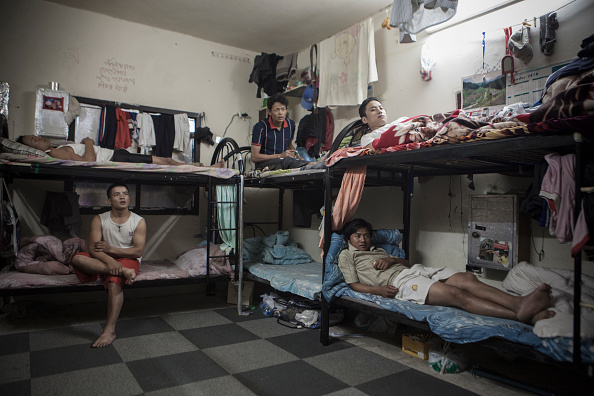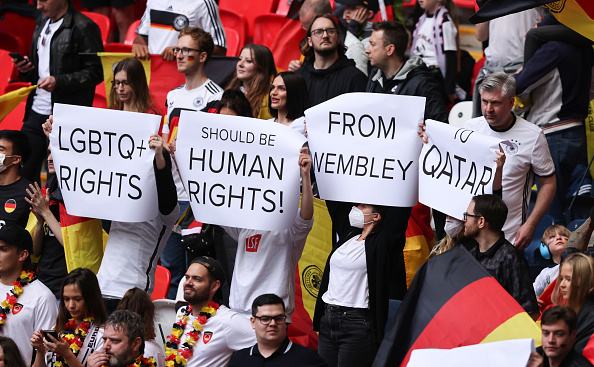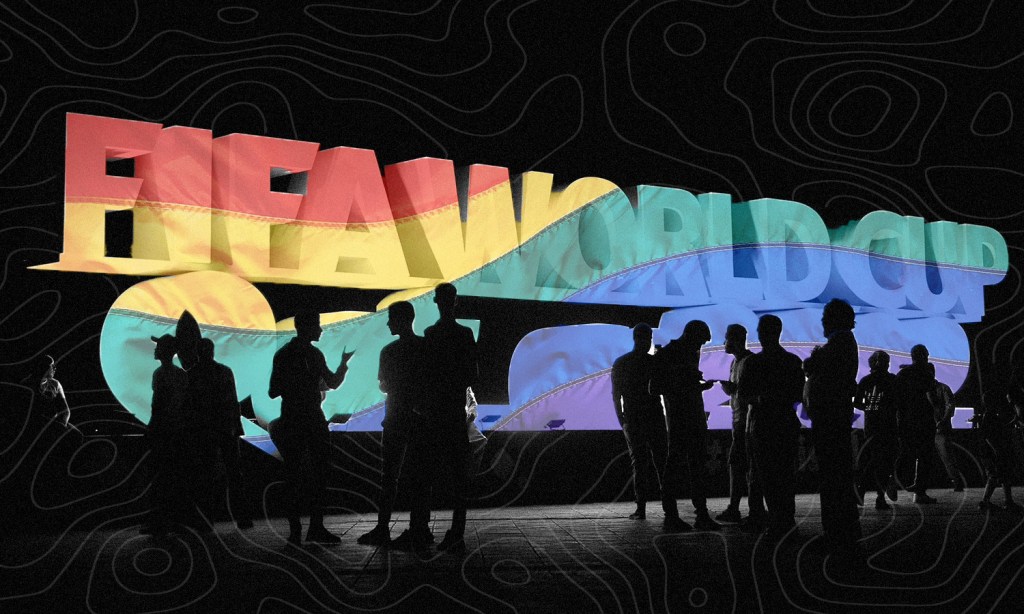Ever since the gas-rich Middle Eastern state of Qatar was chosen to host the FIFA Football World Cup, way back in 2010, it has been the subject of controversy.
From the offset, the controversy centred on Qatar’s human rights record, its lack of a free press, and its outlawing of homosexuality, which is punishable by death.
It also seemed an incredibly odd choice to host a sporting event, typically played on grass during European summer, in a desert state where temperatures reach an average of 42 degrees Celcius in July.
Allegations of corruption, spying, and bribery were soon made and what followed was a decade of investigations, suspensions, and apologies. Of the 22 FIFA executives who made the decision to allow Qatar to host the world cup, just five have not been accused, suspended, or indicted on corruption charges. Controversies about the 2022 World Cup even have their own, very extensive Wikipedia page and the games haven’t even begun yet.
FIFA’s ex-President, Sepp Blatter, has since said that “the choice of Qatar was a mistake.” But despite the furore and the legal backlash, Qatar is hosting the World Cup. What human rights groups have hoped and worked for over the past decade is that some good can come from having this repressive state placed under the microscope of international scrutiny.
Indeed, some good has already come of it; Qatar has recently passed a number of labour reforms that grant some flexibility to migrants under the ‘kafala’ system, whose working conditions have been compared to slavery.
Now that the World Cup is about to begin, celebrities and athletes alike are increasingly turning their attention to the state of LGBTQI+ affairs in Qatar in the hopes that further change can be made.
What Exactly Has Been Going on in Qatar?
Qatar is a tiny but extremely wealthy nation in the Middle East almost entirely surrounded by the Persian Gulf. Of the 2.6 million people who live there, a little over 300,000 are actual Qatari citizens. The rest are immigrants, mainly from the Indian subcontinent. This is important because, without a Qatari passport, rights granted to those immigrants are severely limited.
“What you’ve got in Qatar is a system that treats workers differently depending on whether you are a locally based worker or a worker coming in from overseas,” Justine Nolan, Director of the Australian Human Rights Institute and Professor in the Faculty of Law and Justice at UNSW Sydney told The Latch.
“And your treatment may also differ depending on which country you’re coming from.”
At the time FIFA chose Qatar to host the World Cup, the country had in place something called a ‘kafala’ system. This is basically a sponsorship programme whereby migrants are granted visas that are tied to their employer.
Employers arrange for workers to travel to Qatar and, upon arrival, many have their passports confiscated or otherwise become unable to leave the country due to the financial costs and debts owed to recruiters. Many live in worker camps described as “deplorable,” cramped, and filthy. They would often labour for 12 hours a day without food or water in the brutal Qatari sun.

Being one of the world’s largest exporters of liquified natural gas, it wasn’t hard for the football-mad monarch, Emir Tamim bin Hamad Al Thani, to write a $300 billion cheque to build the hundreds of stadiums, accommodation, transport infrastructure, and official compounds required to host the most-watched sporting event on the planet.
In the process, thousands of migrant workers are estimated to have died while tens of thousands more have been injured.
“We were working on an empty stomach for 24 hours; 12 hours’ work and then no food all night,” Nepali worker Ram Kumar Mahara told The Guardian. “When I complained, my manager assaulted me, kicked me out of the labour camp I lived in and refused to pay me anything. I had to beg for food from other workers.”
The kafala system is not unique to Qatar and is employed all over the Middle East after first being introduced under the British ‘protectorate’ regime that occupied much of the region. However, its use in Qatar has drawn the attention and ire of journalists and international human rights groups for the past decade.
The country also has an extensive ‘domestic servant’ population, mainly women from Southeast Asian countries, who have few rights and frequently become forced into unpaid work or sold into human trafficking and prostitution.
As a strict Islamic theocracy, much of the Qatari legal system is based on Sharia law. As such, the rights of women are heavily restricted in the country, sex outside of marriage is a crime, and drinking alcohol is forbidden, although some hotels are licenced to sell it, and exceptions will be made in stadiums at the World Cup.
In 2014, a modesty campaign was launched to ensure tourists obeyed the country’s strict dress codes. Women were advised not to wear short or tight clothing in public while men were advised against wearing shorts or singlets.
Flogging and capital punishment are both used in Qatar for violations of the law, including homosexuality, which has become a key focus in the lead-up to the World Cup. Gay Times, however, reports that no instances of the death penalty being used to punish homosexuality have been identified.
At the time that the decision was made, FIFA had no human rights requirements for host nations and paid little to no attention to the repressive society it would be empowering to conduct these games.
What Has Changed Since the World Cup Decision?
After serious and sustained pressure from international organisations and human rights groups, Qatar did implement a series of human rights reforms.
In 2021, the kafala system was largely abolished and an increased minimum wage — of $88 per week — was introduced. Employees are now legally allowed to change jobs without the permission of their employer, a key source of abusive practices.
“They have loosened some of those restrictions, but they haven’t removed it entirely,” Nolan said.
“[There have been] steps forward, which have largely come from pressure in holding the World Cup and the world’s attention being focused on them, but is there still an ability to apply discriminatory wage rates between different nationalities? Yes.”
“It’s still not where you’d want it to be,” she added.
A 2021 Human Rights Watch report has found that foreign workers are still suffering “punitive and illegal wage deductions” and “months of unpaid wages for long hours of gruelling work.”
“These programmes’ benefits have been limited due to their late introduction, narrow scope, or faulty implementation,” a 2022 report from the same organisation states. “Significant gaps remain”.
Will LGBTQI Rights Improve in Qatar?
“I would like to assure any fan, of any gender, orientation, religion, race to rest assured that Qatar is one of the most safe countries in the world — and they’ll all be welcome here,” Nasser al-Khater, the Cheif Executive of the World Cup in Qatar, has recently said.
“The safety and security of every single fan is of the utmost importance to us. There’s a lot of training going into security personnel to make sure that things that are culturally different are seen in that frame.”
Athletes, fans, and celebrities however remain unconvinced. International pop star Dua Lipa has said that she will not be performing at the event and will “cheer England on from afar.” Rod Stewart has also said that he turned down a multi-million dollar cheque to perform as “it’s not right to go.”
In protest over LGBTQI+ rights, football captains from 10 different countries will be wearing ‘OneLove’ rainbow armbands as they play, while England and Germany are both flying into Qatar on diversity-themed planes.

Last month, Australia’s Socceroos called on Qatar to legalise same-sex relationships as well as boost rights for migrant workers.
“As players, we fully support the rights of the LGBTI+ people, but in Qatar people are not free to love the person they choose,” the team said in a statement. “These are basic rights that should be afforded to all and will ensure continued progress in Qatar”.
Its a big step for a sport not known not exactly known for embracing the queer community. Whether it will have any impact, however, remains to be seen.
Just last week, Khalid Salman, a Qatari World Cup Ambassador, described homosexuality as “damage in the mind” and said that being gay was “haram” (or “forbidden”).
The Guardian has also reported that gay Qataris are being hunted down and promised safety from physical torture if they help the state identify other queer people in the country.
Nolan is not optimistic that much will change in the long term for the nation.
“With these really large sporting event events, there is a heavy focus in the lead-up. There is a focus during, but during that time, you’re not going to get policy changes. Anything that the government has done, they’ve done now,” she said.
“In terms of long-term changes in policy, I really think that was the movement, early on, when they gave some sort of nod of deference.
“Will it ever change? Yes, hopefully. And the more pressure, the more scrutiny, the more attention on the World Cup can only be a good thing. But will it happen next month? I’m probably not as optimistic about that.”
Although human rights are often thought to be innate, they are in fact granted by sovereign powers, sometimes independent of the will of the people. The decision to grant those rights is the result of both internal and external pressures, the push and pull of domestic and international norms. Although critics often try to claim that sport should be ‘above’ politics, large events like this are inherently political and often become the platform for demonstrations that further add pressure to political shifts.
At least for FIFA, the Qatar World Cup has been something of a “wake up call,” Nolan says.
“I’d be surprised if, when the next time comes around, there isn’t more of an emphasis on human rights policy, which they’ve now got but it’s not really in application in Qatar. But [FIFA] has a much clearer understanding of what’s required and expected of them now”.
Related: GOALLL: Where to Watch the 2022 FIFA World Cup in Australia
Related: A Casual’s Guide to The Agony and Ecstasy of English Football
Read more stories from The Latch and subscribe to our email newsletter.







